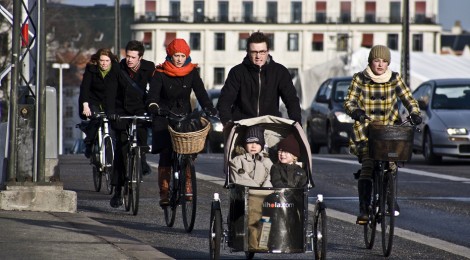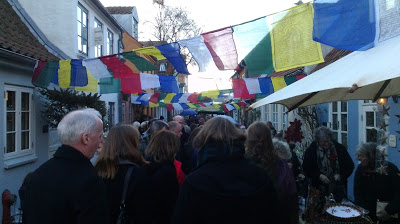Have you read an article that indicates a survey about Denmark, the happiest country in the world? Although I don’t know Denmark’s ultimate recipe for becoming the happiest country in the world yet, but by the time I write this post, I have lived in Denmark for 2 years and 3 months, from being a student until now working. My knowledge about culture and social things are of course still imperfect. However, from what I have observed and experienced personally, below are 7 lessons I have learned from Danish people as an Indonesian who previously lived in Jakarta:
- Mind your own business
I found that many Indonesians are super social that they often care too much about what other people do, that can either be a good or a bad thing. The worst consequence is when they become really affected by what others are doing, which could lead to the tendency to gossip and even spread rumors, which is of course not good as to some extent, this can trigger hatred. In contrast, most Danes really respect private lives and business, in a positive light, they would maximize their time and energy for their personal development and people who are super close to them , e.g. family, best friends, spouse. They are unlikely to interfere with others’ businesses when they overhear random conversations on the bus, for example. It seems like they live in their own “bubble” and pretend that others are “invisible”. However, there is also a negative impact of it, which are, for instance, some people could become very ignorant and refuse to help someone on the bus who need help to buy his/her ticket or more extreme example, they could ignore someone who fell down from the bike. Why is it like that? It is because they respect “privacy” and a sense of independence, and would not take further actions towards another person’s business unless that person is outspoken enough to ask for help.
- Live independently
Many Danes have already lived alone, separated from their parents since they are around 18-19 years old. Many Danes have entered workforce since they are 15, by working part-time in supermarkets and shops, and they do it not because their family is poor, but because their parents have taught them to live independently, be responsible, and learn to earn and manage money to support their secondary needs. While in Indonesia, when teenagers work, there will be million people protesting and shouting “child labour”. Do you see my point? I found out that by being independent and having a sense of responsibility and work with others since a young age, it will develop a great discipline of “stand up on your own feet” and it will also reduce a sense of strong dependency to others, for example to parents. In addition, these people become more aware of money management and productive life.
- Dare to speak up and be proactive

In Indonesian and most Asian culture, people tend to avoid “debates” and conflicts. There is nothing wrong with this, but this kind of culture tends to lead to “silence” when a critical problem arises, this could also lead to the state of “passivity”. For example, when Indonesians have a disagreement with the boss, colleagues, or classmates, many of them would just be passive and silent to avoid conflicts, even when the issue is too critical to be made “straight”. Another example, in the idea generation or brainstorming process, many Indonesians that I found, when they are not very confident with their idea, they would also be silent and “nod” to others’ ideas, even when they disagree, in order to avoid conflict and “judgment”. In contrast, the practice in Denmark is super different. People are well-trained to speak up when they disagree and have different opinions, anywhere, seriously anywhere and to anyone, no matter if the person is the managing director, professor, or parents. This might happen because of the low power distance score that they have (see more on Hofstede cultural dimensions https://geert-hofstede.com/denmark.html). Everyone is regarded as “equal” regardless they age and social status that attaches to them. This also applies in the workplace where proactivity and work autonomy by the employees are crucial. According to Hofstede, “Danes do not lead, they coach and employee autonomy is required. In fact, Denmark ranks highest amongst the EU27 countries in terms of employee autonomy.”
Having had the experience to work at some Danish companies, I found that the bosses do not micro-manage and supervise “in detail”. Most bosses trust the employees and expect the employees to know what they are doing, the bosses won’t guide from A to Z, and won’t do a “regular check-up” on how the employees are doing their tasks, as long as the department’s goals are met in the end. In this case, employees are required to be very proactive and creative. If there is anything that you are confused about or disagree on, speak up and ASK in person!
- Live healthy
There are tremendous amounts of Danes who do running on a daily basis, even when it is raining, windy or even snowing outside, which got me very surprised. These people, they show a true determination to do their routines or to achieve their targets, no matter what happens. Also, many of them eat healthy food, like rye bread and salad on regularly. But of course, just like in any other places in the world, there are some people who are fans of fast food and pizza.
- Support sustainable cause

Denmark is a country that is famous for their “green life” and sustainable energy. In Copenhagen, there are more bikes than cars, which means people will commute with their bike on daily basis. Wind energy is also very big in Denmark, and there had been a couple of days, where the country had energy surplus because of the wind. People here also like to “reuse” items, from buying secondhand items (furniture and clothes), giving them away for free, and of course recycling bottles and cans. When you put your empty cans and bottles to the machine in the supermarket, you will get money from it in a form of a receipt that you should exchange in that supermarket. Believe it or not, many of them are not embarrassed at all for buying secondhand items or getting a little money for recycling cans.
- Simplicity is elegant

Almost every Dane would dress up in black or other dark-colored dresses. All Danes would decorate their house/apartment with Scandinavian style furniture, which is simple, clean, and it plays a lot with the “simple but nice cut” design. The simplicity is also reflected in the way they think and do things. People here are very to the point and straightforward. Most of them are very pragmatic and would find a solution in the simplest but accurate scenario, instead of taking a detour and over-analyzing like most Asians.
- Embrace the cold weather

Living in Denmark, which is located up north, the weather could be quite extreme in the winter time. In any other seasons, except summer, you can expect windy weather almost every day. It is a cold world, but you need to be active, get around, and do your routine. I remember that I had some classes started in the early morning in the winter time when it was still so dark (and of course cold) outside, but I kinda needed to go the class. However, when it is so cold outside, the way they overcome this is by having “Hygge”. Hygge, a Danish word that is hard to be translated, overall means to get cozy and relaxed, and it is usually indoor. Having a cup of warm chocolate is hygge, having dinner with your loved ones with candles on is hygge, to lie down on the couch while watching TV is hygge. Easy, right? 🙂
If you have read these 7 lessons, could it make more sense why Denmark is the happiest nation in the world? Maybe by being simple, to the point, productive, and to live healthy could be a good recipe to be happy. But personally, I think that the happiness survey was more like the “satisfaction” survey, though. They said it themselves that many Danes didn’t have a very high expectation, plus, the country has treated them very well with the good welfare system that at the end has made this country to be relatively one of the safest places in the world. Of course, the score of “happiness” a.k.a. the satisfaction that the citizens give for their country was relatively high.









